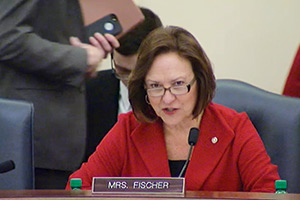Fischer Vows FMCSA Fix

This story appears in the March 9 print edition of Transport Topics.
WASHINGTON — Citing serious concerns with the Federal Motor Carrier Safety Administration’s “flawed approach,” Sen. Debra Fischer (R-Neb.) said she plans to unveil legislation that would reform safety initiatives.
She made the announcement at a hearing here March 4 with the acting head of the FMCSA, Scott Darling, who revealed his tenure is soon to end.
Darling’s term will expire March 23, and the White House is working on a permanent selection. He did not say whether he is among the candidates.
Fischer, chairwoman of the Senate Commerce, Science and Transportation’s Subcommittee on Surface Transportation, said the legislation will seek to create greater transparency of the agency’s regulatory process, guarantee FMCSA carries out more cost-benefit analyses and conduct real-world studies of proposed regulations, such as the hours-of-service rule.
“FMCSA issued the final 34-hour restart rule in 2013 with complete disregard for congressionally mandated requirements for an efficacy study on the rule’s impact,” Fischer said. “When the study was eventually issued several months late, the sample size was not representative of this diverse industry.”
Trucking industry leaders have repeatedly called on the agency to be more transparent and collaborative in the rulemaking process.
After the hearing, Sen. Cory Booker (D-N.J.), the subcommittee’s ranking member, told Transport Topics that he remains determined to restore the recently suspended hours-of-service restart provision.
“I think we have a serious issue, as everybody concludes, about driver fatigue, and it is culpable for many accidents and many deaths. And this seems like a reasonable evidence-based, data-based rule, and it should not have been suspended. And I’m going to look to see as soon as possible for us to return it,” Booker said.
He added that he likely will wait and see what the opportunities are to proceed, suggesting that could entail waiting until FMCSA presents Congress with a study about the rule’s safety effects.
Last year, Booker and Sen. Richard Blumenthal (D-Conn.) fought to block any change to the HOS rule. But under a funding law Congress passed in December, the requirement that drivers take off two consecutive periods of 1 a.m. to 5 a.m. during a 34-hour restart was suspended through Sept. 30.
Before the suspension expires, FMCSA is required to complete a review of safety claims. A majority of Republicans who supported the rule’s suspension are expected to push back on Booker’s efforts.
The Virginia Tech Transportation Institute was selected to conduct the study, and Darling said he expects the findings to be released later this year.
Also at the hearing, Darling told senators the Obama administration’s upcoming transportation legislative proposal would improve safety provisions at the agency, and it would ensure “fair compensation for the hours” commercial drivers work.
Joseph Comé, the Department of Transportation’s deputy principal assistant inspector general for auditing and evaluation, testified as well. He said that FMCSA has made progress with its safety programs but still has challenges in improving its Compliance, Safety, Accountability data quality, shutting down “reincarnated” carriers and enforcing some regulations.
Likewise, Susan Fleming, director of infrastructure issues for the Government Accountability Office, told the subcommittee that there are questions about the reliability of CSA’s safety measurement system in predicting carrier crashes, as well as the agency’s ability to determine the prevalence of so-called chameleon carriers operating on U.S. highways using different company names.
“We agree with FMCSA that a data-driven approach is critical for accomplishing its mission,” Fleming said. “However, we do not believe the agency has developed the most effective methods for using its data to target carriers presenting the greatest safety risk.”
Christopher Hart, acting chairman of the National Transportation Safety Board, testified the increasing number of fatalities from truck-involved crashes was a top reason the board listed truck safety as one of this year’s top 10 areas in need of improvement.
He said his agency has identified shortcomings in FMCSA investigations of motor carriers that have allowed deficient carriers to continue to operate.
“The NTSB has issued 126 safety recommendations to the FMCSA, and more than half of them remain open,” Hart told the subcommittee.
Hart testified that fatigue is “far too often” cited as a contributing factor in truck accidents.
“The NTSB sees a disturbing trend of crashes involving fatigued drivers operating well in excess of hours-of-service limitations,” he said. “The FMCSA must expeditiously issue the final electronic logging device rule to increase hours-of-service compliance for maximum safety.”
Hart also encouraged Transportation Secretary Anthony Foxx to direct FMCSA and the National Highway Traffic Safety Administration to require carriers to deploy safety systems such as speed limiters, forward collision warning and electronic stability control.
The day before, Foxx told the full Senate Commerce panel that the White House soon will unveil a “new and improved” transportation funding plan. Details of the six-year, $478 billion legislative proposal, an update of last year’s Grow America Act, were revealed in the fiscal 2016 budget the Obama administration sent to Congress on Feb. 2.
“Our six-year proposal will provide the funding growth and long-term certainty so desperately needed by our states and local communities so they can make real progress on addressing our infrastructure deficit,” Foxx said.

